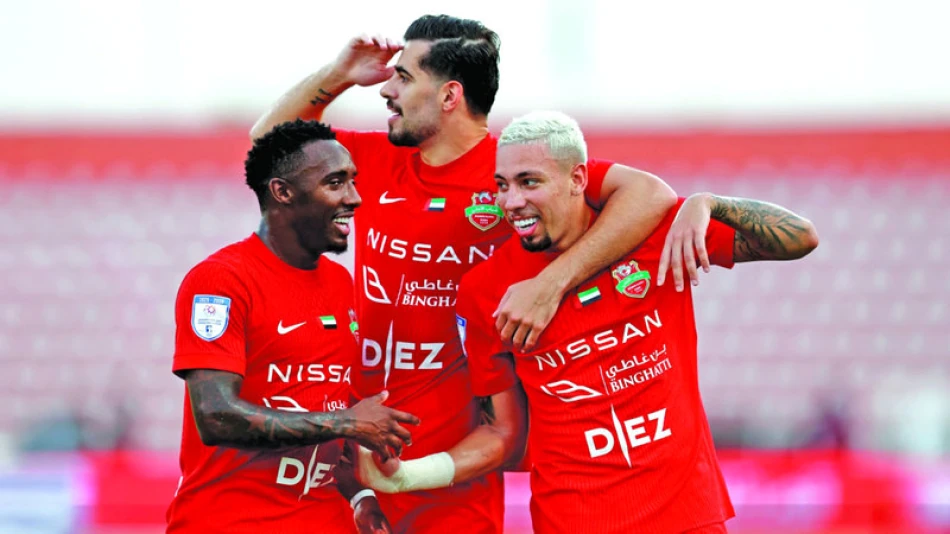
Maatouk's Dream Team: Al-Ahly's Promising Youth and Miloš' Untapped Potential
UAE Pro League Opens with Climate Challenges and Stadium Cooling Innovations
The first round of the UAE's ADNOC Pro League has delivered promising signs despite sweltering conditions, with Shabab Al-Ahli emerging as the standout performer and clubs pioneering stadium cooling technology to combat extreme heat. Former international goalkeeper and technical analyst Moataz Abdullah highlights how climate adaptation is becoming as crucial as tactical preparation in Gulf football.
Shabab Al-Ahli Sets Early Benchmark
Shabab Al-Ahli's commanding 2-0 victory over Al Dhafra has established them as early title favorites, with Abdullah describing the Dubai-based club as the current "dream team" of Emirati football. Under Portuguese coach Paulo Sousa's guidance, the club has achieved remarkable technical stability, bolstered by shrewd summer transfer activity that appears to have paid immediate dividends.
The club's success reflects a broader trend in UAE football toward professional management structures and strategic recruitment—a model that mirrors successful approaches seen in Saudi Arabia's Pro League transformation and Qatar's domestic competition strengthening.
Climate Innovation Takes Center Stage
Stadium Cooling Technology Deployment
Two clubs have made headlines for reasons beyond the pitch, implementing stadium cooling systems to combat the region's notorious heat. Al Ain's Hazza bin Zayed Stadium and Zabeel Stadium both deployed cooling technology during opening fixtures, representing a significant infrastructure investment in fan experience and player performance.
This technological adaptation addresses a persistent challenge in Gulf football—maintaining competitive standards and spectator engagement during extreme weather conditions. The initiative could set a precedent for other regional leagues facing similar climate pressures, particularly as global temperatures continue rising.
Heat Impact on Performance Standards
Abdullah noted that climatic conditions visibly affected both team performance and officiating standards during the opening round. This observation underscores a critical challenge facing Middle Eastern football: balancing traditional scheduling with increasingly extreme weather patterns that can compromise game quality.
Coaching Carousel Continues
The league's coaching landscape has undergone significant changes, with Serbian coach Miloš moving from Al Wasl to Sharjah, replacing Romanian Cosmin Contra who departed to manage the UAE national team. However, Abdullah suggests Miloš's tactical imprint has yet to materialize in his official debut.
Al Jazira terminated Moroccan coach Hussein Ammouta's contract, reflecting the high-pressure environment where coaches face immediate scrutiny. This rapid turnover mirrors patterns seen across Gulf football, where patience with underperforming coaches remains limited despite the complexities of squad integration and tactical implementation.
Emerging Talent and Strategic Positioning
Foreign Player Spotlight
Brazilian midfielder Jonatas Santos, on loan to Al Nasr from Al Ain, emerged as the standout foreign player of the opening round. Serbian coach Slaviša Jokanović's tactical repositioning of Santos demonstrates the value of experienced coaches in maximizing player potential—a reminder that coaching expertise often matters more than star signings.
Market Implications
The league's early developments suggest clubs are increasingly focusing on tactical sophistication over pure spending power. This evolution could attract greater regional and international investment as the competition demonstrates improved organizational standards and entertainment value.
For broadcasters and sponsors, the stadium cooling initiatives and improved game quality present enhanced commercial opportunities, particularly as regional football seeks to compete with European leagues for viewer attention during overlapping seasons.
Looking Forward
Khor Fakkan's impressive 3-2 victory over Al Jazira under local coach Hassan Al Abdouli highlights the potential for Emirati coaching talent, while Dibba's organized performance despite a 3-1 defeat to Sharjah suggests competitive balance across the league.
The combination of climate adaptation technology, coaching evolution, and tactical development positions the ADNOC Pro League for potential growth in regional influence and commercial value, provided clubs maintain investment in both infrastructure and sporting excellence.
Most Viewed News

 Sara Khaled
Sara Khaled






